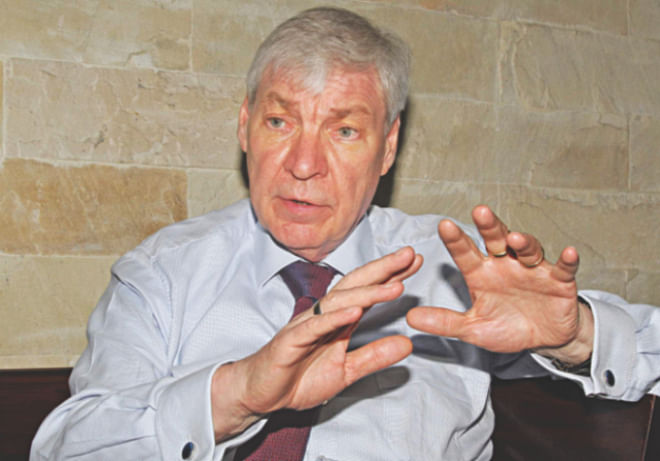Improve standards in apparel factories
Improve standards in apparel factories
Chief of Trade Union Confederation warns Bangladesh of losing European buyers

Bangladesh is well known for producing low-priced apparel items across the world. But just being price competitive is not enough to win the hearts of the European consumers, especially after the fire at Tazreen Fashions and Rana Plaza building collapse that took the lives of at least 1,247 workers and injured more than 2,000.
The local clothing sector requires continual improvements to ensure workplace safety and better living conditions to avert the risks of losing customers in Europe.
Michael Sommer, president of International Trade Union Confederation (ITUC) and chairman of German Confederation of Trade Unions, shared
his views with The Daily Star on a recent visit to Dhaka.
ITUC is a platform of autonomous and democratic trade unions, representing 168 million workers in 155 countries.
Sommer came two weeks ahead of the one year anniversary of the Rana Plaza collapse in Savar.
He met survivors of the two deadly accidents, Prime Minister Sheikh Hasina, labour rights activists and visited garment factories.
He said there has been visible progress in security and social standards in the sector, which was necessary after the tragedies.
Sommer praised the government's initiative to establish an industrial park in bids to ensure the establishment of garment units in a planned manner, ensure safety, and encourage relocation of the clothing factories from the capital.
However, lots still need to be done in order to improve workers' safety and their social standards, he added.
Unless the government and factory owners continue to remain focused, there are risks for the $20 billion worth export-earning sector, he said.
"The risk is that it will be impossible to sell Bangladesh garments in Europe," warned the 62-year old.
"Bangladesh's image was really damaged in Europe by these accidents. And for the consumers, it is necessary to have a good image, not only low prices."
"You are producing garments in the low price segment for Europe and if companies think the only way (to do business) is to give low prices and people (consumers) do not care, they are on the wrong path. People care about the living conditions of the workers here."
There are alternative garment makers around the world, he said.
"If you want to be the champion in garments, you have to become champions in ensuring proper working conditions too. Otherwise, people in Europe will say it is possible to get garments from other countries, from other regions," said Sommer, who lives in Berlin.
European Union members account for 56 percent of Bangladesh's total garment exports, with Germany being the biggest consumer in Europe.
"I think that if Bangladeshi apparel makers believe that there is no pressure on their sketch, they are really wrong. They can dream on but they have no alternative but to improve working conditions. Otherwise, they are losing the business."
He favoured continuation of independent inspections to monitor progress. "It is crucial that independent inspection continues throughout the sector."
The recent international initiatives, especially the Accord, which involves employers and trade unions as equal partners, are a promising sign in helping the sector move forward.
But he also reminded global apparel retailers and local factories about their responsibilities. "Some of the injured workers are unable to work anymore in the sector and they do not have any income. So, it is my role to remind brands and factory owners to come forward and compensate the workers."
“Accountability for what happened at Rana Plaza and Tazreen lies with the factory owners and the international brands that sourced from these factories. There is no way that they can deny their responsibilities.”
"This means that compensation must be paid.”
The ITUC president criticised the bar on formation of trade unions in the amended labour law.
The 30 percent membership requirement to form a trade union at a factory is abnormal and not in line with international standards, he said.
The threshold should go and the international community expects that Bangladesh adjust its labour legislation and working conditions in line with international standards, he added.
Trade unions in the export processing zones also have to be allowed; labour movement in Bangladesh also needs to be recognised as an integral part of the economy, he said.
Referring to his talks with the prime minister, Sommer said Hasina has promised to work further to bring the labour law in line with international standards and ILO conventions.
"She knows and should remember that international labour movement and the international community will continue to remind Bangladesh of bringing standards in line with international standards."
ITUC and the German trade unions do not support boycotts, although there is a campaign to boycott clothes of international brands that source from Bangladesh, he said.
"We do not think that is the way to change anything because people and workers will be affected and will potentially lose their jobs."
Discussions are necessary on the gap between brand's purchase price of garments from Bangladesh and the retail tag prices of the same in European markets, he said.
"We need to close that gap and make sure that more money comes to Bangladesh. However, what we do not want that the money ends up in the pockets of the owners. This money needs to go to the workers."
A huge task lies on the government's shoulders to improve social and safety standards in the factories, he said.
But no-one expects that the government would do that overnight, this will require time, he added.
“I do not expect a big jump. I expect some steps forward.”